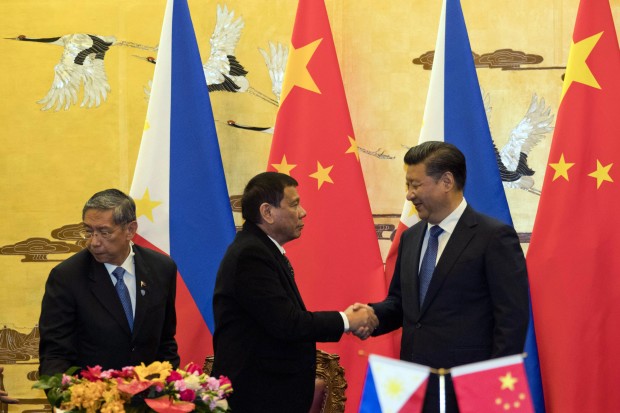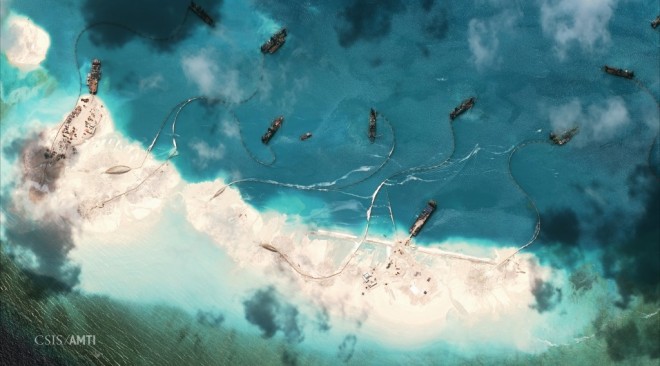What will be the Philippines’ place in the new world order?
(Editor’s Note: As 2016 comes to a close, the Inquirer asks in its yearender series seven questions for the new year, considering key local and international events that shaped what many regard as one of the most turbulent years in modern times. This sixth part questions the part the Philippines will play in the ever changing world order. Read the rest of the series at https://inq.news/2016-news-highlights.)
2016 comes to an end with a Philippines that is slowly making peace with its enemies–and butting heads with countries and organizations it considered staunch allies.
All eyes were on the Philippines after the United Nations Arbitral Tribunal declared on July 12 that the country had exclusive sovereign rights over the West Philippine Sea.
BACKSTORY: Philippines wins arbitration case vs. China over South China Sea
The historic case aimed to invalidate China’s claim of “historic rights” over 90 percent of the South China Sea through its “nine-dash line” declaration that overlaps with the Philippines 200-nautical mile exclusive economic zone.
The decision, which is legally binding alongside the UN Convention on the Law of the Sea, has been praised by international bodies. China, however, has refused to honor it.
READ: ‘China’s refusal to join arbitration a serious violation of Unclos’
But tensions over the groundbreaking decision began to ease after President Duterte and Chinese President Xi Jinping agreed to bilateral talks and to temporarily set aside the maritime row. The current strategy is the complete opposite of the position taken by the former administration under President Benigno Aquino III, who filed the case in January 2013.
“’Di ako makikipag-away kasi wala akong nakikitang magandang solusyon kung makikipagpatayan (I won’t go into a fight because I don’t see any good solution from killing each other),” Duterte said after a state visit to China. “Sabi niya, we can resolve this case peacefully, walang away, walang dugo and it will take time.” (He said, we can resolve this peacefully, no quarrels, no blood. It will take time.)
READ: Duterte on South China Sea claims: We won’t insist now
During the visit, over 400 top-level businessmen accompanied the President to a business forum in mainland China, in an effort to warm relations and secure key funding for infrastructure projects.
Among the deals sealed during the trip were the Subic-Clark railway project and the Bonifacio Global City-Ninoy Aquino International Airport Segment of the Metro Manila Bus Rapid Transit-Edsa project.
READ: Itemized list of PH projects covered by China’s $15-B investment pledges to Duterte

Philippine President Rodrigo Duterte, center, and Chinese President Xi Jinping shake hands after a signing ceremony in Beijing, China, Thursday, Oct. 20, 2016. Duterte was meeting Thursday with Xi in Beijing as part of a charm offensive aimed at seeking trade and support from the Asian giant by setting aside a thorny territorial dispute. AP
A ‘rockstar’ debut?
But not all ties are as tightly wound, if the President Duterte’s penchant for slurs will be considered.
Among the countries and people he has called out or cursed are:
- Mexico (April 8)
- Australia (April 20)
- The United Nations (August 21)
- Outgoing US President Barack Obama (September 5)
- The European Union (September 20), even if he later told Russian President Vladimir that he wished to be part of the EU
- The Catholic Church (September 27)
- The Jews (September 30)
The United States, in particular, has borne the brunt of his ire. At one point, the President even threatened to cut economic and military ties with the country’s long-time ally.
READ: President Duterte’s remarks on cutting ties baffle US officials
Such outbursts have proven tricky to defend during the administration’s first few months, particularly during his first two international events since the inauguration: the Association of Southeast Asian Nations summit in September and Asia Pacific Economic Cooperation summit in November.
His communications staff might have called him a “rockstar” in his world debuts, but his absences in key dinners and meetings could be seen as missed opportunities to foster stronger relations.
READ: No-show Duterte in ceremonies should be non-issue—Palace
The Philippines needs every opportunity to bounce back after scandals such as the $81-million Bangladesh Bank heist, the biggest money-laundering case ever detected in the country, and to survive the global economic uncertainty in the coming year.
Timeline: $81-million money laundering
Let’s hope our hosting of the Miss Universe pageant and the Asean summit in 2017 are signs of good things to come for the country.
READ: It’s going to be a very unique Miss Universe, says MUO president
What will be the Philippines’ place in the new world order?
Let us know your thoughts. Comment on our Facebook page or tweet us at @inquirerdotnet.
/rga















